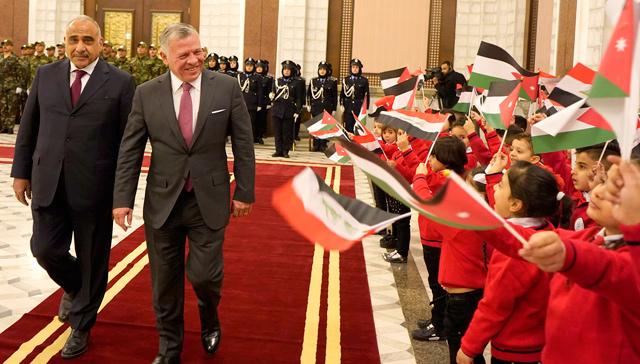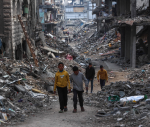You are here
Besides pushing economic agenda, Iraq visit asserts Kingdom’s political role — experts
By Abdul Rahman Bazian - Jan 14,2019 - Last updated at Jan 14,2019

His Majesty King Abdullah meets with Iraqi Prime Minister Adel Abdul Mahdi in Baghdad on Monday (Photo courtesy of Royal Court)
AMMAN — “The number one man and decision maker” in the Kingdom is taking point in the under-way efforts to restore momentum to Jordanian-Iraqi economic, trade and political relations, said Hashemite University Professor of Political Science Jamal Shalabi in reference to His Majesty King Abdullah.
“Jordan is obviously rising as an accepted and trusted mediator, regionally and internationally, as an integral part of the ongoing efforts to resolve the mounting tension with Iran,” Shalabi noted.
The recent visits by ranking French, Egyptian and American officials and ministers support Jordan’s role as such, he said.
“I think Jordan is asserting its place as a broker between the East and the West, as His Majesty’s visit to Iraq is largely political, as well as economic,” the professor underlined.
Much has changed in the region, recently, as well as internationally, according to political and economic analysts.
“The idea of war or the imposition of Israeli terms on Iran, for one, via the US, I think is no longer viable for all regional and global stakeholders in the region. Negotiation is the only way to contain the rampant tensions in the area, and Jordan is Iraq’s bridge and gateway to the rest of the world, as well as Iran’s”, Shalabi argued.
More so, the professor insists that the King’s visit is in and of itself a message to both Iraq and Iran that Jordan will not indulge in efforts to further polarise the region.
Jordan’s role in the geo-political landscape and dynamic is crucial, political analyst and commentator Amer Sabaileh agreed.
“Though the Kingdom recalled its ambassador from Tehran not long ago, the truth is that Jordan has no interest in any confrontation or escalation of tensions with Iran,” he added.
According to Sabaileh, Jordan enjoys a relatively leveraged position with Iraq and Iran, compared to other regional and international players, he said.
“Jordan is once again proving indispensable to the international and regional diplomatic and political operation, as was the case in Syria and elsewhere,” Sabaileh noted.
“The Kingdom has interests in Iraq, and the King’s personal attention and effort to ensure the realisation of these interests is evidence to their vitality, political stakes included,” Sabaileh contended.
“Beside furthering Jordan’s economic interests and its regional and international role, I think His Majesty carried important messages to the power halls of the Iraqi state,” he concluded.
These messages are meant to reassure Iraq on Jordan’s historic stance and continued support, while giving Iran yet another bridge to cross with the international community, having burnt almost all of them these past few years, Shalabi noted.
On the flipside, the fact remains that Jordan is geographically, historically and economically tied to Iraq, economist Isam Qadamani pointed out.
“With Daesh out of the picture in Iraq now, the two countries [Jordan and Iraq] can finally work on rebuilding ties and strengthening economic and security relations,” he added.
“The security situation in Iraq was the biggest hurdle to revitalising trade relations with our neighbour to the east. Now, His Majesty’s visit will speed up the implementation of the bilateral agreements signed and encourage the Iraqis to push forward on the frontiers of energy and economic cooperation,” Qadamani noted.
Jordan has huge stakes in Iraq, economist Mufleh Akel highlighted.
Moreover, it helps with Jordan’s main competitor in Iraq: Iran, as it sends a reassuring message to the Iranians, ahead of the US-lead Warsaw convention, which seeks to enact joint efforts to contain Iranian influence in the region, Akel noted, especially in light of the recent visit of Iranian Foreign Minister Mohammad Jabad Zarif to Iraq.
“The King’s visit points to Jordan’s good intentions towards Iran and Iraq.”
Meanwhile, “His Majesty would not have personally gone to Iraq had there not been concrete, bankable assurances on the Iraqis’ commitment to the agreements signed during Prime Minister Omar Razzaz’s visit in December,” Shalabi agreed.
On the domestic economic front
Domestically, time is of the essence, according to Shalabi.
Jordan faces various economic and social challenges, including culminating national debts and unemployment, in the absence of prospect markets to rejuvenate the economy, he highlighted.
“Iraq and Syria are crucial to Jordan’s export economy, which has suffered greatly due to the border closure and has reflected negatively on the national socioeconomic situation,” Shalabi continued.
Notably, exports to Iraq dropped from nearly JD883.1 million in 2013 to around JD367.7 million in 2017, followed by a 36 per cent increase in July 2018, compared with the same month in 2017, data from the Department of Statistics showed.
The visit will expedite under way projects that will reflect positively on Jordan’s economy and speed up recovery, Akel underscored, particularly the Basra-Aqaba oil pipeline, which will lower energy costs for Jordanian producers and the state alike and the implementation of the joint industrial estate, in addition to Jordan’s expected participation in Iraq’s reconstruction.
“The fact that King Abdullah is taking the lead on this underlines both the solidity of the challenges facing Jordan and reaffirms the promise of economic recovery in the near future,” Shalabi said, adding that this “historic” visit will result in tangible outcomes soon.
Combined, Jordan’s total exports of pharmaceuticals, fertilisers, raw phosphate and potash in 2017 amounted to some JD1.03 billion, at 23 per cent of the total export mix.
Jordan’s overall exports amount to around JD4.35 billion worth of goods and commodities, including national products and reexports.
Although the Department of Statistics has no public data on Jordan’s exports of phosphate and potash to Iraq in specific, they do show that among the Kingdom’s top industrial goods exported to Iraq in 2017 were pharmaceutical products and fertilisers, at JD61.8 million and JD47.3 million, respectively.
In December last year, Iraqi Minister of Industry and Minerals Saleh Jubouri told The Jordan Times that he expected Jordanian exports to Iraq to double in 2019.
On the sidelines of the Jordanian government’s visit to Iraq, Razzaz told reporters that the implementation of the pipeline, to supply Jordan 10,000 barrels of oil per day, is imminent.
The premiers of both countries announced February 2 as the deadline for the launch of the agreements and projects in a joint press statement.
Other agreements were signed, including the adoption of the back-to-back freight shipping mechanism, in addition to a memorandum of understanding to link the Iraqi power grid with Jordan’s.
The premier also said that the two countries will be working together to settle unresolved financial issues dating back to before the occupation of Iraq in 2003.
Iraqi Ambassador to Jordan Safia Al Suhail confirmed to The Jordan Times that a joint technical committee on the matter is scheduled to meet before February 2.
Ministry Spokesperson Anas Qatatshah confirmed to The Jordan Times that the Finance Minister Ezzeddine Kanakrieh is to chair a specialised ministerial committee on the “thorny” topic, but did not disclose further information.
Related Articles
AMMAN — “The number one man and decision maker” in the Kingdom is taking point in the under-way efforts to restore momentum to Jordani
AMMAN/BAGHDAD — The governments of Jordan and Iraq, two weeks ago, concluded talks to facilitate economic, trade and power cooperation and d
AMMAN — Jordan’s exports to Iraq in 2015 stood at $690 million compared to $1.16 billion in 2014, the Jordan News Agency, Petra, reported on















